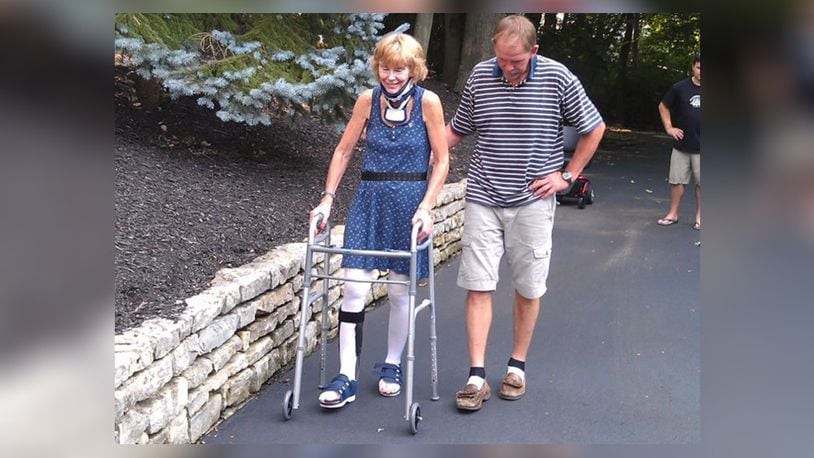“I graduated from Belmont High School in 1969,” LeValley said. “I was always active growing up,” LeValley, a 1969 Belmont High School graduate, said. “But there were no sports for girls when I went to high school.”
LeValley took up running by joining a running group in Kettering called the Striders Club. Striders was founded in 1966 by local physical education teacher, Steve Price, to give girls and women opportunities to compete in track and field events.
“I was involved with Striders for about three years,” LeValley said.
LeValley earned her degree in education from Wright State University in 1976. She graduated with a master’s degree from the University of Dayton in 1988. By then she was married and had a successful career in real estate. Her daughter Lauren (Dunn) was born in 1981 and her son Kent, in 1985.
“It got to the point where it was too much,” LeValley said. “I took a few courses to catch myself up on technology and began teaching at Kettering Fairmont High School in 1996.”
LeValley had also started running again after losing her mother.
“It was a very sad time, and I missed my mom but I enjoyed getting out an running again,” LeValley said.
LeValley set a personal goal to run up to the top of Schantz hill near her home. She ran daily, started participating in 5K and 10K runs and in 1998, ran her first marathon. She had rediscovered her passion.
Then one day her then second grade daughter came home with a flyer about a local running club, announcing she wanted to run.
“I was surprised,” LeValley said. “She was quiet and shy, but I took her to her first cross country practice, and she loved it.”
As Dunn grew, she continued running and, like her mother, developed a passion for it. After LeValley ran the Boston Marathon in 2001, she read an article in “Runner’s World” magazine about the Seven Continents Club, which gives runners the opportunity to run around the world. LeValley asked her daughter if she wanted to join the club with her.
“We did our first marathon in Boston,” LeValley said. “Then we did Sweden, Brazil and Africa, at the base of Mt. Kilimanjaro.”
On June 30, 2013, LeValley was celebrating her 62nd birthday in Cincinnati with her partner, Jim Schoenlein. She was days away from leaving for Australia to run in her seventh continent, when the unthinkable happened. As they were returning home on Interstate 75 the couple’s car ran off the road and hit a telephone pole. LeValley’s air bag didn’t deploy.
“I don’t remember much other than waking up in the hospital in the ICU,” LeValley said. “I was in and out of consciousness, but I knew immediately that I was paralyzed.”
The accident left LeValley’s cervical spine partially severed, and she had no feeling from her armpits down. She was transferred to Miami Valley Hospital, where she remained for a month. She also completed six months of outpatient physical therapy.
“At the end of it all, they told me this was my new normal,” LeValley said. “There is no cure for what I have, and I wouldn’t be gaining any more progress.”
But LeValley was determined to walk again. She went from being completely bedridden to standing for longer periods of time and eventually walking between parallel bars.
“I was encouraged to get a wheelchair, but I refused,” LeValley said. “That wasn’t the way I wanted to live my life.”
LeValley began slowly walking around her neighborhood with a cane and with Schoenlein supporting her. Today she is walking every day, working on her balance and learning to live her new normal.
But LeValley never forgot her ultimate goal of finishing the seven continent challenge and is determined to complete it, whatever it takes.
“Every year I am losing muscle,” LeValley said. “Before I lose any more mobility, I want to complete that last marathon.”
She realizes that much has to happen to accommodate her needs, including getting approval from the marathon organization in Sydney so she can walk the course over a period of days at her own, slower pace.
“I feel like in my mind that I can do this, as long as I can do it my way,” LeValley said.
LeValley said that no matter the outcome, she is grateful for her family and especially the time she and her daughter spent running together around the globe.
“I used to think how horrible it would be to be paralyzed,” LeValley said. “And then it happened to me and you just learn to go on. I am just thankful that it wasn’t any worse than it was.”
About the Author
